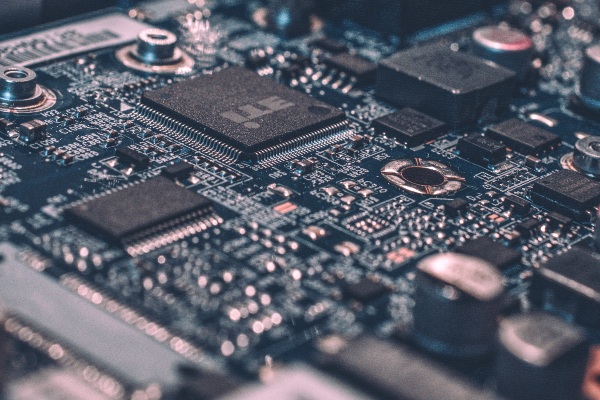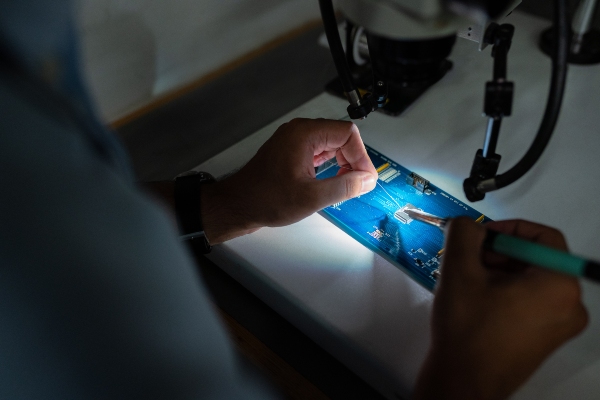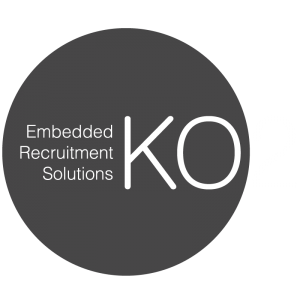The role of hardware engineer is one of the most hands-on positions in the engineering industry, allowing for plenty of opportunities to design new components or systems and assemble or install them. Hardware engineers also work across a huge range of job sectors, creating plenty of opportunities no matter where your interests lie.
Hardware engineers often work with embedded systems, designing the components and devices that they are part of. This is an area of the engineering industry that is predicted to keep growing for some time, so it’s a role that both employers and candidates should be thinking about when it comes to business growth or career prospects.
In this article, we explain what hardware engineering is, the responsibilities of a hardware engineer, and how you can get into the role.
What is Hardware Engineering?
Hardware engineering is a kind of engineering that focuses on design, creating, testing and managing the production of components for computer systems and the systems that store and run software on a computer. It also covers any electronic component or device involved in embedded systems design that allows for non-computer devices or equipment to join a system connected by embedded technology.
Both entire systems and the individual components that make them up are part of hardware engineering, so it’s quite a broad subject that requires a technical understanding of a range of things. The hardware involved in this type of engineering can range from servers, data partitions and rack setups to individual components like sensors, fans and microchips.

What is the Role of a Hardware Engineer?
The role of a hardware engineer is to work with computer hardware throughout the development process, working with the physical elements of all kinds of computer systems to ensure that the software on them runs correctly and can achieve its purpose.
On a specific level, a hardware engineer may simply design or build system components, using their technical skills to create small parts of much larger systems. They may also be involved in testing components and physical systems, checking for potential issues and ensuring that everything meets relevant quality and safety standards.
Hardware engineers in more senior or managerial positions may be involved in the broader development of systems by supervising the design and production of components and their installation. They may be in charge of coordinating all the work that goes into creating the hardware for a new system or device and managing its launch to remove any issues or setbacks.
What Does a Hardware Engineer Do?
The term ‘hardware engineer’ is pretty broad and can include a wide range of more specific roles with different responsibilities. However, the list below gives you a general idea of the kind of things that a hardware engineer might do in their day-to-day role.
- Designing hardware systems, such as electronic circuits, using CAD software
- Designing components to work as part of hardware systems
- Creating proposals for new hardware in line with requirements and functionality expectations
- Reviewing hardware design documentation and suggesting improvements
- Testing initial hardware and component models
- Troubleshooting problems with hardware and identifying solutions
- Building final versions of new components
- Integrating new components or devices into an existing computer system
- Making improvements to existing systems with new hardware
- Improving existing hardware components
- Ensuring that new components meet necessary quality and safety standards
- Supervising manufacturing of hardware
- Maintaining hardware and computer systems to ensure continued functionality
- Testing existing computer systems and hardware to ensure quality and safety standards are still being met
- Installing computer system hardware in locations that require it
- Producing technical documentation for new hardware designs
- Working with software engineers to ensure software compatibility and functionality
There are also more specific hardware engineer responsibilities that come with specialist roles within this field. Here are a few of the most common.

Trainee Hardware Engineer
A trainee hardware engineer tends to be an engineering candidate that is right at the start of their career or a more experienced engineer that is new to working with computer hardware. They will often have much less responsibility than the people they work with and may work in tandem with a mentor or supervisor that trains them whilst they work.
Embedded Hardware Engineer
Embedded hardware engineers are a type of hardware engineer that works specifically with the components and devices involved in embedded systems. They will need specialist knowledge of embedded technology and may be responsible for anything from designing systems and components to creating user documentation and installing devices to complete a wider system.
Hardware Design Engineer
A hardware design engineer is an engineer that specifically works in the design stage of hardware development, completing electronic circuit design. They will draw up plans for proposed circuit boards and make changes until a design is approved, then produce relevant documentation and instructions that ensure other hardware engineers will be able to build their designs
How To Become a Hardware Engineer
Hardware engineering is a relatively easy industry to get into, as you can have a background in quite a variety of disciplines in order to possess the skills needed to succeed in the role.
To begin with, most hardware engineering candidates study relevant subjects at school to gain the right foundation for an engineering degree. You will need to do well in Maths and English Language at GCSE level and get at least a C grade (or equivalent).
Most engineering degrees require applicants to have at least one or two relevant A-Level qualifications. Studying maths or physics is an excellent idea, but subjects such as design technology or computer science may also be very useful. As an alternative, a BTEC/SQA national certificate or diploma will give you the same levels of qualification as an A-Level.
The majority of hardware engineers have studied an engineering or similar discipline at university. This is not a necessity, as there are apprenticeships that will give you the right levels of practical experience to work in entry-level hardware engineering jobs, but you may find that your job prospects are better if you have a degree.
The best degree you can study to become a hardware engineer is a BSc or MSc in Electronics Engineering, as this will involve lots of modules that will give you the relevant skills for the role. However, as hardware engineers can work in a variety of industries, the majority of engineering degrees will give you enough of a background to train for this role later on.
Most hardware engineers begin their careers in junior roles, gaining practical experience and getting a feel for whether they enjoy the industry. You may work as a junior engineer or a technician in a variety of industries, from embedded systems to manufacturing.
Many hardware engineers specialise in a particular sector or type of hardware or system, so as you progress you’ll likely start to gravitate towards certain jobs. You may end up as a senior hardware engineer that supervises the development or installation of new systems, or you may gain specialist skills and experience with a particular component and become a consultant.

Key Skills for Hardware Engineers
As a hardware engineer, some technical skills will benefit you greatly and that potential employers will be looking out for, no matter the requirements of your role. Here are some of the most important.
Verilog
Verilog is a programming language that is used for hardware description. It’s the industry standard for electronic systems, which means that the majority of hardware engineers need to be comfortable coding and understanding this language if they’re going to be designing electronic components and systems.
This isn’t a programming language that is taught as widely as C or C++, which means that many hardware engineering candidates have to learn it as part of a role or teach themselves to increase their skill set. Not all hardware engineering jobs will involve Verilog, but it’s frequently used in hardware design so you should at least understand the basics.
Engineering Design
Having an understanding of engineering design is what differentiates hardware engineers from general computer programmers. Engineering design is a methodological process that is used to solve problems in the industry and may be used as a framework for hardware design projects, so engineers that are familiar with what it involves will be able to take part and understand the entire project trajectory more easily.
Board Design
Board design refers to circuit board design, which is a big part of hardware design engineering. Designing circuit boards is one of the first stages of developing new systems across a range of industries, and having experience drawing up these designs, as well as testing, and analysing the prototype boards, is a very valuable skill for engineers that work with hardware.
CAD
CAD stands for computer-aided design, which is an essential skill for all kinds of hardware engineers. Whether you’re designing a circuit board as we have discussed above, visualising an entire system or creating a new component or embedded device, almost all engineers now use CAD software in order to bring their ideas to life and accurately plan what will be needed to create them.
Most engineering disciplines include an introduction to CAD at a university level, but certain industries may favour certain kinds of software that hardware engineer candidates may benefit from becoming familiar with.
What is the Salary of a Hardware Engineer?
As we’ve already touched on, there is quite a lot of variety when it comes to the responsibilities and role requirements of different hardware engineering jobs, which means that calculating an average salary isn’t going to be accurate for everyone.
As a general benchmark, data from Glassdoor shows that the average annual salary for a hardware engineer in the UK is around £41,000. You will likely be on a lower salary at the beginning of your career and may earn more than this when you’re in a role that involves more responsibility or requires more specialist knowledge.
Summary
Hardware engineering is a really exciting branch of the industry that is ideal for candidates that want hands-on work as part of their job and enjoy being part of a team that creates and improves systems and processes. Embedded systems engineering is a sector that more and more hardware engineers are moving to, so it’s definitely a role with a lot of potential for career progression and growth.
If you’re an engineering candidate seeking a role in hardware engineering in the electronics and embedded systems sector, KO2 is a specialist recruitment agency that can match you to your perfect role. Get in touch and find out more about how our recruitment agency can help.







